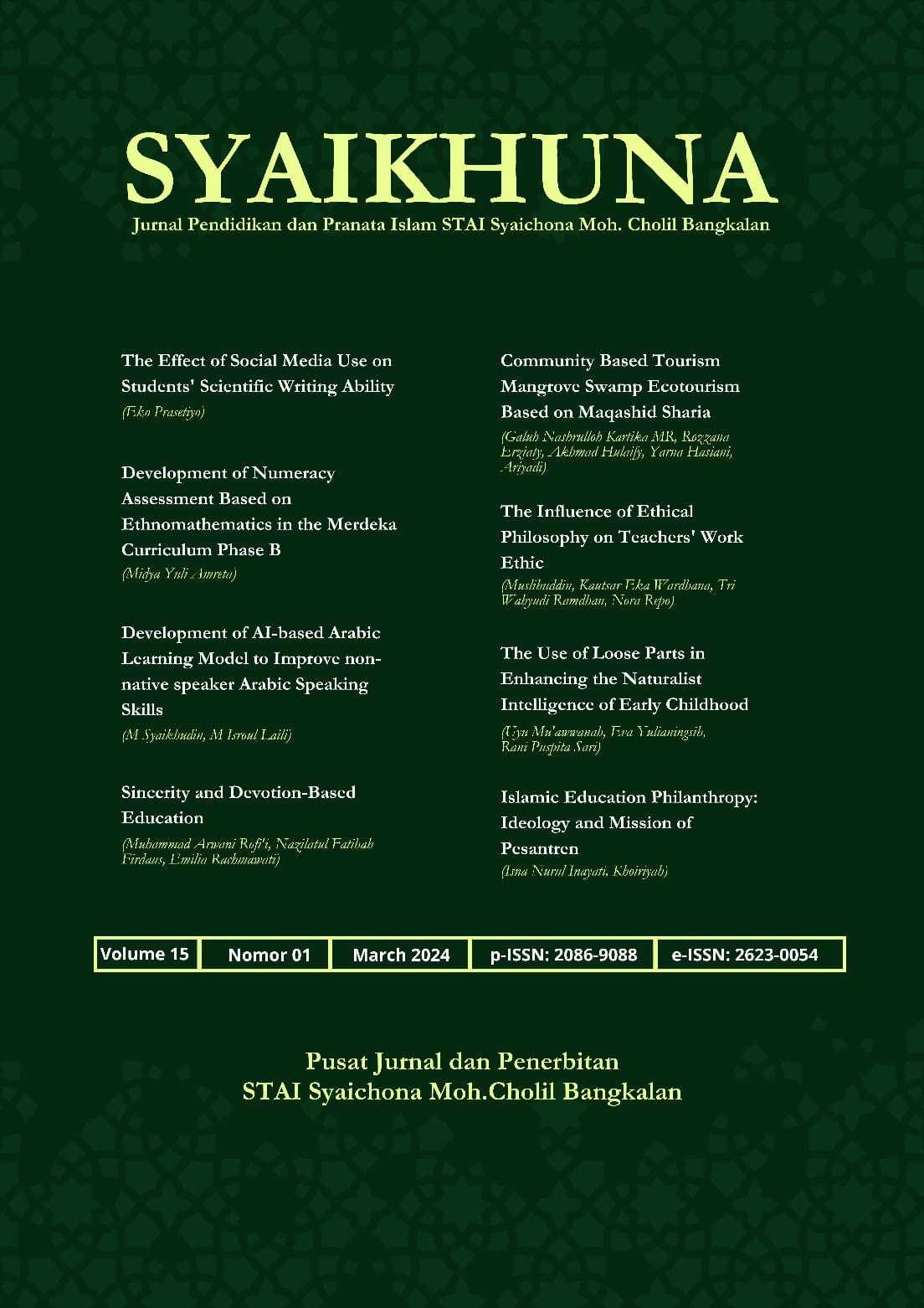Development of AI-based Arabic Learning Model to Improve non-native speaker Arabic Speaking Skills
DOI:
https://doi.org/10.62730/syaikhuna.v15i1.7295Keywords:
Arabic language learning, Artificial Intelligence, Non-native speakers, Speaking skillsAbstract
This research delves into the development of an Artificial Intelligence (AI)-based Arabic language learning model with the aim of enhancing Arabic speaking skills for non-native speakers. The background of this research arises from the complexity of Arabic language learning, which requires not only an understanding of grammar and vocabulary but also proficiency in speaking with an accurate accent and intonation. The research methodology includes the selection of suitable AI algorithms, the development of a prototype model, and further testing on non-native speakers at the Sekolah Tinggi Agama Islam (STAI) al-Yasini, Pasuruan. The utilization of AI technology is expected to provide innovative solutions to address individual learning needs in the context of the Arabic language. Mid-term evaluation results indicate that the AI learning model can positively impact Arabic speaking skills, although improvements are still necessary. User response analysis provides valuable insights that serve as the basis for further model refinements. Suggestions for future research include further development of the AI model, broader testing across various non-native speaker groups, and the integration of user feedback to enhance Arabic speaking skills holistically. The implications of these research findings are expected to significantly contribute to the development of adaptive and innovative Arabic language learning.References
Adeeb, Omer Farooq Ahmed, and Seyed Jahanshah Kabudian. “Arabic Text Steganography Based on Deep Learning Methods.” IEEE Access (2022).
Almurayh, Abdullah. “The Challenges of Using Arabic Chatbot in Saudi Universities.” IAENG International Journal of Computer Science (2021).
Alsadoon, Reem. “Chatting with AI Bot: Vocabulary Learning Assistant for Saudi EFL Learners.” English Language Teaching (2021).
Basri, Muhammad, Andi Anto Patak, Andi Musdariah, and Amirullah Abduh. “Innovative Learning Technology (ILT) in Indonesian Vocational Higher Education.” International Journal on Advanced Science, Engineering and Information Technology (2020).
Ciolan, Laura, Anca Petrescu, Camelia Radulescu, and Cristian Bucur. “Training Teachers to Use Digital Resources for the Knowledge Society.” Procedia - Social and Behavioral Sciences (2014).
Ghosh, Susmita, Ashutosh Muduli, and Sameer Pingle. “Role of E-Learning Technology and Culture on Learning Agility: An Empirical Evidence.” Human Systems Management (2021).
Han, Jiying, and Xiaohui Geng. “University Students’ Approaches to Online Learning Technologies: The Roles of Perceived Support, Affect/Emotion and Self-Efficacy in Technology-Enhanced Learning.” Computers and Education (2023).
Ifenthaler, Dirk. “Supporting Higher Education Students through Analytics Systems.” Journal of Applied Research in Higher Education, 2020.
Mathews, Anne, and Cheryl Ward. “Effective Practices of Succesful Blended Learning Schools.” Frontiers in Education Technology (2019).
Mohammed, Zahra K., and Nada A.Z. Abdullah. “Survey For Arabic Part of Speech Tagging Based on Machine Learning.” Iraqi Journal of Science (2022).
Moulieswaran, N., and Prasantha N.S. Kumar. “Investigating ESL Learners’ Perception and Problem towards Artificial Intelligence (AI) -Assisted English Language Learning and Teaching.” World Journal of English Language (2023).
Rebolledo Font de la Vall, Roxana, and Fabián González Araya. “Exploring the Benefits and Challenges of AI-Language Learning Tools.” International Journal of Social Sciences and Humanities Invention (2023).
Reyes-Foster, Beatriz, and Aimee DeNoyelles. “Using Photovoice as a Critical Pedagogical Tool in Online Discussions.” Teaching and Learning Anthropology (2020).
Sharaf, Abdul Baquee M., and Eric S. Atwell. “QurAna: Corpus of the Quran Annotated with Pronominal Anaphora.” In Proceedings of the 8th International Conference on Language Resources and Evaluation, LREC 2012, 2012.
Woo, Jin Ha, and Heeyoul Choi. “Systematic Review for AI-Based Language Learning Tools.” Journal of Digital Contents Society (2021).
Yang, Hongzhi, and Suna Kyun. “The Current Research Trend of Artificial Intelligence in Language Learning: A Systematic Empirical Literature Review from an Activity Theory Perspective.” Australasian Journal of Educational Technology (2022).
Downloads
Published
How to Cite
Issue
Section
License
Copyright (c) 2024 M Syaikhudin, M Isroul Laili

This work is licensed under a Creative Commons Attribution 4.0 International License.





